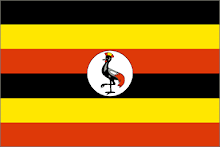-Dr. Emmett Brown, Back to the Future Part II
I don't know if Doc ever took the DeLorean to Uganda in 2009, but he might as well have. Because like Doc and his flying time machine, Ugandans don't need roads either--or more precisely, don't have them. At least not roads in the sense that you or I know them.
The roads of Kampala are generally paved, but they are scarred with axle-breaking potholes. Many of these potholes are large enough to swallow up a small car or motorcycle taxi, and they can delay traffic by turning a two-lane road into a narrow bottleneck.
One such pothole exists at an intersection on my way to work. It is big enough for me to lie down in, and it forces cars that could otherwise gently merge into traffic to come to a complete stop before turning hard into a fast-moving traffic lane. And it is not alone. Big bastards like this are everywhere.
On one late-night motorcycle taxi ride, my driver and I were almost sent sprawling when one crept up out of the darkness and flattened the driver's front tire. He was able to get me back home on the flat tire. I don't know if he was as lucky.
On a busride to Jinja to go rafting, the road from Kampala backed up, bringing traffic to a standstill. The source of the delay was a wide, multi-cratered gash in the road that forced all traffic--in both directions--onto the shoulder, invading a roadside market.
The potholes are comical at first, frustrating upon spending more time in the country, and ultimately emblematic of the gross inefficiency of basic public works projects that are victimized by the greed of government employees who would rather buy cars for themselves than roads for their constituents.
***
I was able to witness the birth of one of these potholes on the street below my apartment over the course of a few days. It was like watching the creation of the universe. From nothing came something.
It began with a slow trickle of water originating in the middle of the street, running down into Kampala Road. It grew over the next day or two until it was a puddle a few feet across that emptied with the splash of wheels running through it, but slowly filled again, its source some unseen force below the tarmac of the street.
The leak went unattended for so long that if you looked at the section of road downhill from its source (which didn't seem to alarm anyone in its first three or four days of life) you would have thought that it was raining.
By the next day, my roommate Dan and I had taken up watching the pothole in the afternoon when we returned from work. Nursing Bell Lagers, we'd excitedly watch to see if cars would run through the pothole, hopefully soaking someone either on a bike or on foot that was unlucky enough to be in the splash-radius. Was this a bit childish? Yes. But also unceasingly entertaining.
Later that night, on the way to the gas station across the street to collect the deposit on the now-empty bottles of Bell, I saw that a group of men were working to fix the leaking pothole. Without any apparent official uniforms or vehicles, the men had sectioned off the street and were shining lights down onto the still leaking pothole.
By the next morning, the leak was no more, and the pothole had been filled with a red, dusty clay that smoothed over the road. Over the following days, the dust slowly hollowed out until it was again a crater, but at least without the leak.
The pothole remained in that state until I left Uganda nearly three weeks later. And it serves as a reminder of the problems the country still faces.
Driving on a highway or surface street in America you take for granted the smooth, paved road. It is a natural and obvious part of our everyday lives that most of us cannot remember being without.
Yet in Uganda, the idea of a paved road or consistently running water or uninterrupted electricity is not a given, but a luxury that citizens still hope for and do not expect.
A young man who worked in the High Court with colleagues of mine has lived in this country for the last ten years of his life. His father is a consultant for the development of roads and highways. The young man, Vuk (pronounced Vook), told us a story of a road project outside Kampala where a company owned by the President's brother had received a contract to pave a new road. After six months and millions of dollars, less than one kilometer had been paved. There were no repercussions for the brother or his company.
The politicians and members of parliament and police chiefs and directors of road development and those lucky enough to be within the long arm of nepotism and cronyism are getting rich and living a life of excess in Uganda. The country's citizens are breaking axles and getting soaked.

What no picture? No time lapsed movie? Stop slackin'
ReplyDelete